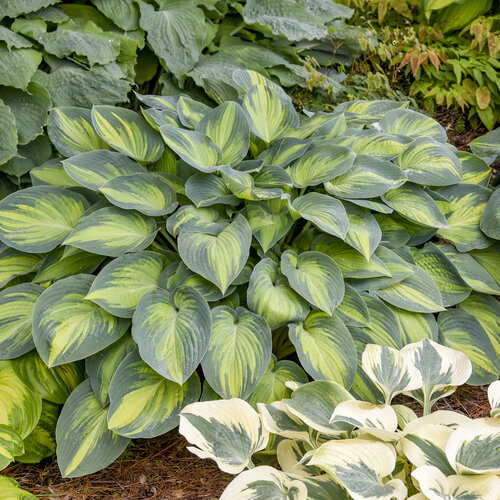The Happy Hosta
June Hosta
Regular price
$16.00 USD
Regular price
Sale price
$16.00 USD
Unit price
per
Shipping calculated at checkout.
Couldn't load pickup availability
Quart Size
Hosta 'June' is a highly regarded variety prized for its stunning foliage and ease of care. It's a particularly excellent choice for adding vibrancy to shade gardens. Here's a closer look at its characteristics:
Appearance
- Leaves: Heart-shaped with striking variegation. The centers emerge gold and transition to a medium-light chartreuse, while the margins are a distinctive blue-green. The leaves have a thick texture, making them somewhat resistant to slug damage.
- Flowers: Pale lavender, bell-shaped blooms appear on tall stalks in mid to late summer.
- Size: Forms a dense mound of foliage reaching about 15-18 inches (38-46 cm) tall and spreading 20-30 inches (51-76 cm) wide.
Growing conditions
- Light: Thrives in shade to partial shade (less than 6 hours of sun). Morning sun can intensify leaf colors, but avoid harsh afternoon sun exposure.
- Soil: Prefers moist, well-drained, humusy soil that is slightly acidic (pH 5.5-7.5).
- Watering: Requires consistent moisture, especially during the first growing season to establish a strong root system. Once established, it can tolerate some dry shade, particularly varieties with thick leaves. However, soils should not be allowed to dry out completely.
- Hardiness Zones: Hardy in USDA Zones 3-9.
Care and maintenance
- Low maintenance: Generally considered a low-maintenance plant.
- Fertilizer: A light application of fertilizer in early spring can be beneficial.
- Mulching: Mulching helps retain soil moisture and suppress weeds. Apply a layer of finely shredded organic material, but avoid piling it directly against the crown of the plant.
- Pests: Slugs are a potential issue. Consider using slug bait, beer traps, or diatomaceous earth for control.
- Winterizing: Leaving foliage standing in fall can help protect the crown during winter. Trimming off leaves in late fall can help manage slugs.
- Propagation: Easily propagated by division in spring or autumn. Each division needs some roots and shoots.

